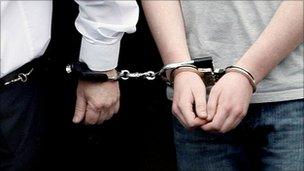Youth Justice Board saved from quango cull
- Published

The quango says it has overseen a 45% drop in young people entering the criminal justice system
The government has abandoned plans to scrap the Youth Justice Board, minister Lord McNally has announced.
The decision comes shortly after another U-turn over plans to axe the post of chief coroner.
Both issues had threatened to derail the passage of the Public Bodies Bill through the Lords on Wednesday.
The Ministry of Justice said the youth justice system still needed reform but, "following careful consideration", the board would be saved.
The board was set up in 1997 to oversee the youth justice system and ensure that under-18s in custody were kept in safe conditions.
Both it and the office of the chief coroner were to have been scrapped as part of a so-called "bonfire of the quangos".
But the government was defeated in the House of Lords on both decisions earlier this year, and there were fears that continuing anger over the proposed abolition could have led to another defeat at the latest stage of the bill.
'Considerable opposition'
Announcing the reprieve, Lord McNally said the government realised "that the future of the Youth Justice Board is an emotive issue".
He said ministers believed its functions could have been brought in-house and carried out by the Ministry of Justice, but they accepted that in both Houses of Parliament and in a public consultation there had been "considerable opposition" to such a move.
Crossbench peer and former chief inspector of prisons Lord Ramsbotham, whose amendment reprieving the board was accepted by the government, welcomed the decision, saying the body had proved its worth during the summer riots.
"During that period the Youth Justice Board played an enormously important part in liaising with, overseeing and helping both the youth offender teams out in the community and also the oversight of those being received in custody who required a great deal of help," he said.
For Labour, shadow justice secretary Sadiq Khan said he welcomed the government's "long overdue change of mind".
"The YJB does an important job battling to reduce youth offending," he said.
"It has a proven track record in reducing crime, which is why it was madness for the government to want to abolish it and why Labour and so many groups have campaigned for its survival with such determination."
But Mr Khan said the work of the board was "still being undermined by severe cuts to youth offending teams, which work within communities to cut crime and anti-social behaviour".
In October the government announced it was scrapping 192 public bodies - such as the Film Council and the Audit Commission - while 118 would be merged.
It said the move would save more than £1bn, but opposition to the plans has led to the reprieve of about 20 quangos and forced ministers to drop proposals to abolish 150 more without parliamentary approval.
'Prepared to listen'
A Ministry of Justice spokesman said: "Following careful consideration we have decided not to pursue the abolition of the YJB as part of the Public Bodies Bill.
"However, we still believe that youth justice system should be reformed to make it more efficient and directly accountable to ministers. Further details will be announced in due course."
Juliet Lyon, director of the Prison Reform Trust, said the government had "shown that it is prepared to listen to reason".
"By holding on to the Youth Justice Board it can build on an impressive drop in youth crime and continue to reduce the numbers of children and young people getting into trouble," she said.
"By saving the office of the chief coroner it can improve standards and reduce unacceptably long delays for all bereaved families including those waiting for years to know how and why a loved one died in custody whilst in the care of the state."
- Published1 March 2011
- Published24 January 2011
- Published7 January 2011
- Published14 October 2010